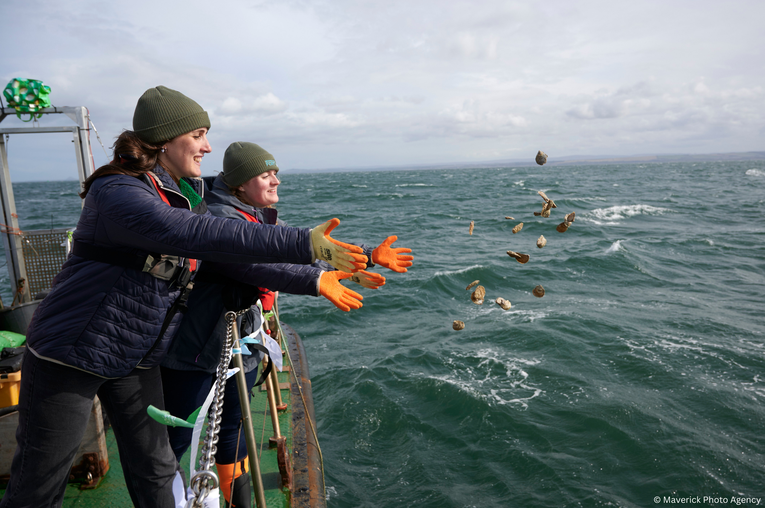
The Government can promote ocean recovery: here’s how
Our Marine Natural Capital Analyst, James Merchant, runs through how investment in ocean recovery could deliver for nature and communities at home and across the world.
Our blue planet is one of our biggest allies when tackling the dual crises of climate change and biodiversity loss.
By taking action to address and mitigate the impacts of these crises, the Government has an opportunity to create jobs and investment opportunities while empowering local communities as stewards of coastal environments. Improving water quality and funding restoration projects is key to achieving this.
By investing in the following key areas, the UK Government could raise its ambition for our marine environment, coastlines and coastal communities:
Greater investment into blue jobs
In the US, 15-30 jobs are created in restoration programmes for every $1 million USD spent, creating six times more jobs than the equivalent investment into oil and gas.
Job creation in local economies leads to knock-on benefits such as increased property values, higher tax revenues and greater recreational spending. This, alongside other socioeconomic benefits, results in a 10-to-1 return on investment in coastal restoration.
Each restoration job then creates additional other jobs, many of which could be created in the marine leisure and recreation industry. This is the sector of the UK’s marine economy that, by far, supports the most jobs - over 56% of those linked to the coastal and marine environment.
We would encourage the Government to adopt a community-based approach. This will give coastal communities ownership of the coastal assets they would be protecting, such as seagrass meadows or oyster reefs.
This ensures they’re invested in the ecosystems’ protection and benefit from their success. Successful coastal restoration requires buy-in from the local community, who in turn need to directly benefit from the jobs and revenues it creates.
With ongoing community support, these jobs can be supported in the long term, meaning the protection and restoration of these habitats can create multigenerational livelihoods that shape local identities.
Boosted government funding to unlock private investment
We now know that private finance institutions have a growing appetite to invest in the blue economy. Globally, 66% of publicly-listed companies are dependent on ocean health, with $8.4 trillion USD of assets and revenues at risk if the ocean is unable to provide the services which support businesses, such as coastal protection and tourism.
Some will see blue finance as a necessary investment to protect value, but others are looking at the blue economy as a significant emerging sector of sustainable investment.
A major barrier to private finance in the UK’s blue economy is a lack of sizeable projects to invest in. A lot of work is underway to create the markets, codes and methodologies to enable private investment and increased public funding for these efforts will likely speed up progress. However, projects remain expensive and risky.
Blended finance, where government funds cover the financial risk of project failure, would significantly support greater private investment by making projects financially viable to investors.
Using blended finance can help bridge the gap between costs of projects and revenues from potential ecosystem services such as carbon and biodiversity credits, allowing more projects to succeed and scale-up over time.

Credit: Maverick Photo Agency
More funding to improve water quality
Water quality is the thread that runs through the blue economy. Improved water quality would boost both the success of marine restoration projects and the socioeconomic benefits that our coastal waters deliver.
It’s therefore essential for cleaner seas that provide economic growth, job and food security, and climate mitigation benefits.
This is also an issue that is firmly on the radar of the British public and over half of the UK population will consider the response to the sewage crisis when deciding who to vote for in the upcoming election.
Improving water quality could create jobs too, with each $1 million invested into improved storm overflow management in the US resulting in between 5 and 20 additional jobs. Project success rates would rise, as would the likelihood of private investors securing returns on their investments.

Credit: Sam Mansfield
Delivering on improved water quality and financial support for marine restoration would create the conditions for jobs, livelihoods, and economic opportunities. The benefits of this would start at local scale and feed into the national economy while providing opportunities for institutional investors to bring in greater sums of investment.
This would be a quadruple win for people, our economy, ocean recovery and the UK’s global marine leadership. This is a key opportunity for the UK Government to highlight the huge opportunities for our blue planet to communities, investors and financial institutions - both domestically and globally.
We urge the UK Government to maximise the potential of its investment and think ambitiously about our blue planet.
Ahead of the next General Election, we’ve been asking all political parties to support the policies in our Manifesto for our Seas - our twelve-point plan for cleaner, healthier and better-protected seas.
Adopting these policies would ensure there is pressure and support to push these issues forward within UK Government. The asks are for all parties - the climate and biodiversity crises impact everyone and we therefore need a collaborative approach.



